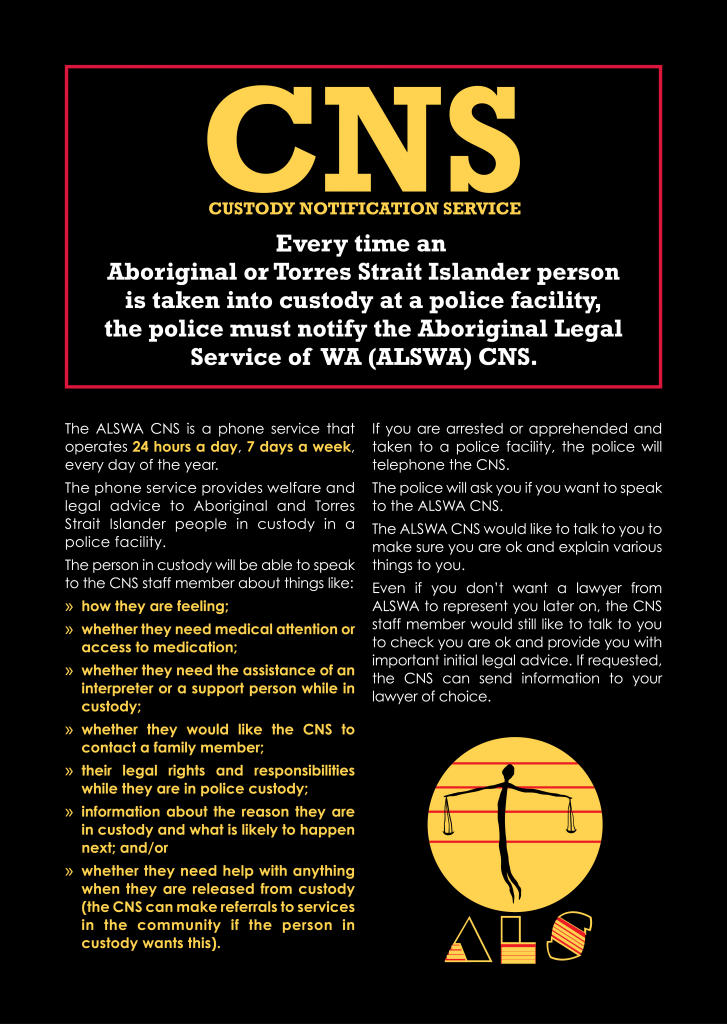About the ALSWA CNS
The ALSWA CNS commenced on 2 October 2019. The CNS is a phone service operating 24 hours per day 7 days per week every day of the year for Aboriginal people in Western Australia who are detained by WA Police in a police facility. The main objectives of the CNS are to prevent or reduce Aboriginal deaths in police custody; prevent or reduce harm suffered by Aboriginal people in police custody; and protect the legal rights of Aboriginal people in police custody.
These objectives will be achieved by conducting a thorough and culturally competent welfare check; providing appropriate early fundamental legal advice; and referring Aboriginal people to the appropriate services to address ongoing welfare and legal needs.
Under the Police Force Amendment Regulations 2019 (WA), which commenced on 2 October 2019, WA Police are required to phone the CNS every time an Aboriginal person is detained in a police facility throughout the state. WA Police are required under the Regulations to phone the CNS and advise the CNS staff member of the name of the person detained. They are also required to advise the CNS why that person has been arrested or apprehended; the name and contact details of the Responsible Officer; whether the detainee is likely to be released on bail (if arrested for an offence) and, if not, where that person will be taken; and other relevant details. The WA Police must provide a reasonable opportunity for the detainee to speak with the CNS staff member and the responsible officer must make themselves available to speak with the CNS staff member after the phone communication between the CNS and the detainee has finished.
ALSWA worked closely with WA Police during the implementation phase for the CNS, including a five-week voluntary trial at selected police stations. ALSWA and WA Police continue to liaise closely to ensure that the CNS is operating effectively and is achieving the intended objectives.
At the time of its implementation, the Western Australian CNS is the broadest CNS to operate in Australia. It applies to all Aboriginal people, both children and adults, and applies whenever an Aboriginal person is arrested or apprehended by WA Police and detained in a police facility (irrespective of the reason). Hence, the WA CNS will apply in a variety of situations such as when a person is arrested for an offence, arrested on a warrant (e.g., warrant of commitment for unpaid fines, return to prison warrant or warrant to be brought before court); apprehended for protective reasons due to intoxication; detained for the purpose of being served with an order (e.g. family violence restraining order); or detained for the purpose of undergoing a mandatory infectious diseases test.
In order to provide the CNS to the Aboriginal community in Western Australia, ALSWA has entered into a three-year agreement with the Commonwealth Government (National Indigenous Australians Agency) and the WA Australian Government (Department of Justice). Pursuant to the Commonwealth Grant Agreement the aim of the CNS is to ‘provide a holistic wellbeing check for Aboriginal and Torres Strait Islander people held in a police lock-up, with or without charge, and by so doing reduce preventable Aboriginal and Torres Strait Islander people deaths in custody and related harm’. The WA Government has also jointly funded the CNS with the expectation that in addition to the matters required under the Commonwealth agreement, the CNS will, wherever possible, conduct a ‘fine check’ with the person detained. Where the CNS identifies that the detainee has outstanding fines registered with the Fines Enforcement Registry (FER), staff work with the FER to facilitate ‘time-to-pay’ arrangements and consider referrals to the ALSWA Work and Development Permit Service. .
The CNS has funding for 10 FTE positions (7 lawyers and 3 Aboriginal support workers). The CNS employs a mix of full time, part time and casual staff. As at 12 October 2020, the CNS employs 2 Aboriginal lawyers and 4 Aboriginal support workers. All staff undertake comprehensive training prior to their commencement with the CNS.
ALSWA is privileged to provide this important service in Western Australia and is committed to providing a culturally safe CNS for the Aboriginal community.

Background
The Royal Commission into Aboriginal Deaths in Custody (RCIADIC) was established in October 1987 and the Commission’s report was released in April 1991. RCIADIC recommended the police should notify Aboriginal Legal Services whenever they take an Aboriginal person into custody (RCIADIC, recommendations 223, 224 and 243.)
In particular, recommendation 224 provided:
…in jurisdictions where legislation, standing orders or instructions do not already so provide, appropriate steps be taken to make it mandatory for Aboriginal Legal Services to be notified upon the arrest or detention of any Aboriginal person other than such arrests or detentions for which it is agreed between the Aboriginal Legal Services and the Police Services that notification is not required. (RCIADIC (1991), recommendations 223, 224 and 243.)
Since the RCIADIC, numerous inquiries have recommended the establishment of a CNS in each Australian jurisdiction, including the Western Australian State Coroner and the Australian Law Reform Commission.
New South Wales had been operating its CNS for many years and ALSWA has consulted extensively with ALS (NSW/ACT) while advocating for a CNS in Western Australia and as part of its preparatory work for the establishment of a CNS in WA.